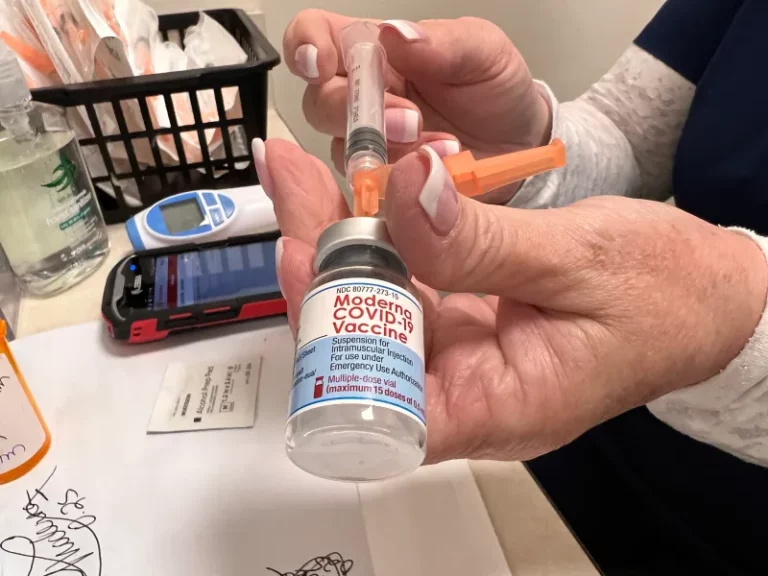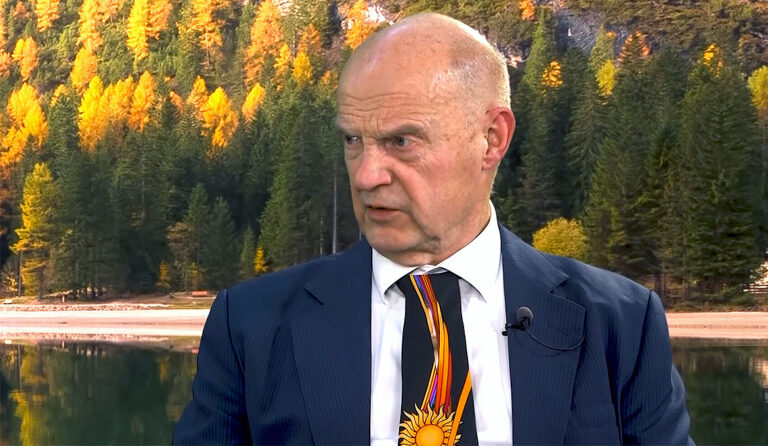Is the Public Ready for the Truth About COVID Vaccines?
RealClear Health this month published an op-ed by Dr. Pierre Kory, president and chief medical officer of the Front Line COVID-19 Critical Care Alliance, and journalist Mary Beth Pfeiffer that raised questions about COVID-19 vaccines and rising cancer rates. Is it a sign that mainstream media is finally ready to allow debate on the vaccines?
Are mainstream media and the public becoming more open to news and perspectives contradicting the establishment narrative on COVID-19, the vaccines and the prevailing public health policies of the past four years?
If so, can such incremental change eventually lead to a transformation in public attitudes?
At least one medical expert thinks so. Writing on Substack, Dr. Pierre Kory, president and chief medical officer of the Front Line COVID-19 Critical Care Alliance, cited the April 25 publication of a RealClear Health op-ed he co-wrote with journalist Mary Beth Pfeiffer as an example of how the public narrative may be changing.
The op-ed analyzed evidence finding that mRNA vaccines are the cause of a significant spike in cancer among young people.
Kory wrote that this is the fifth op-ed he and Pfeiffer have published in mainstream, widely read news outlets since August 2023 on related topics.
“It appears the public’s appetite for objective, independent analysis of vaccine harm is increasing,” Kory wrote on Substack.
Widening the ‘Overton Window’
Kory suggested the willingness of media outlets like RealClear Health to publish articles critical of COVID-19 policies and vaccines suggests a widening of the “Overton Window,” a concept that “refers specifically to the kind of policies politicians can ‘legitimately’ support over time without risking electoral support.”
Writing for the Brownstone Institute on April 17, Jeffrey Tucker said the Overton Window concept — named for researcher Joseph Overton, who worked at the Mackinac Center for Public Policy — “grows out of think tank culture, which puts a premium on effectiveness and metrics as a means of institutional funding.”
According to Tucker, Overton “found that it was useless in his work to advocate for positions that he could not recruit politicians to say from the legislative floor or on the campaign trail.” Instead, Overton found greater success when “crafting policy ideas that fit within the prevailing media and political culture.”
Other scholars later further developed Overton’s concept. Today, the Overton Window includes five stages that ideas pass through before becoming policy, moving from “unthinkable” to “radical” to “acceptable” to “sensible” to “popular.”
According to the Mackinac Center, Kory wrote, the range of acceptable ideas within the Overton Window can change over time, as it “can both shift and expand, either increasing or shrinking the number of ideas politicians can support without unduly risking their electoral support.”
Speaking to The Defender, Kory applied the concept to COVID-19 narratives. “We are seeing an acceptance to raise questions and discuss the unusual rise in death and disability rates among populations that include some of the healthiest and most productive people,” Kory said, citing the August 2023 op-ed he co-wrote for USA Today.
Kory said the USA Today op-ed, which presented insurance company data showing a dramatic increase in excess deaths in the fall of 2021 — deaths that cannot be fully attributed to COVID-19 infections — represented “the first time [that] someone from our ‘side’ crossed over into the mainstream media to raise these types of questions.”
“The acceptance to have a conversation like this in USA Today would have seemed impossible in 2022,” Kory said. The subsequent publication of his latest op-ed, in RealClear Health, “shows just how far we have come,” he said.
“If you keep your eye on the Window … you might succeed in expanding it a bit here and there and thereby achieve your goals eventually,” Tucker wrote.
But, he added:
“We live in times in which most of what we thought we knew about the strategies for social and political change have been blown up. … Everything is broken, including whatever imaginings we had about the existence of this Overton window.”
In his article for the Brownstone Institute, Tucker said that while “the theory of the Overton window presumes a smooth connection between public opinion and political outcomes,” this assumption is “gravely in question” today.
“Politicians do things daily and hourly that are opposed by their constituents — fund foreign aid and wars for example — but they do it anyway due to well-organized pressure groups that operate outside public awareness,” Tucker wrote.
Instead, Tucker called for bolder truth-telling. “Many people knew the truth — that everyone would get this bug, most would shake it off just fine, and then it would become endemic — but were simply afraid to say it. Cite the Overton window all you want but what is really at issue is one’s willingness to exercise moral courage.”
Tucker didn’t entirely dismiss the existence of the Overton Window. “I do think the Overton Window exists, but it is largely constructed. Breaking down the constructs is our task, whether incrementally or all at once,” he told The Defender.
Kory said the “truth-telling” is taking place — and is becoming more difficult for the mainstream media to ignore.
He said:
“The evidence on excess deaths, injuries from vaccines, and the reality of long COVID is becoming undeniable to most, regardless of where they might have stood on these issues a few months ago.
“Anecdotally, and unfortunately, there is a growing number of people from all sides of these issues who know someone close to them who has been diagnosed with a chronic condition they have no family history of or is usually associated with someone many years older.
“As this unfortunately continues, more people appear to be opening up to at least raising questions and exploring what was once thought of as ‘contrarian evidence’ to find answers.”
Incremental broadening of COVID narratives accepted by the mainstream media
The RealClear Health op-ed, “As Cancers in the Young Rise, the Pandemic Response Must Be Probed,” openly questioned recent U.S. government claims that the risk of seizures and pulmonary embolisms caused by the COVID-19 vaccines was worth the benefit for children and adults:
“We question this, with more than one million reports of potential vaccine injuries and 18,000 deaths on the government’s own, long-trusted and likely undercounted, early warning system. These, the government takes pains to dismiss.
“As evidence mounts and a movement of injured people grows, the Biden administration must recognize this growing public health problem. It must cease to stifle debate that has limited what journals print and what the public knows about vaccine consequences.”
Later in the op-ed, Kory reviewed data from the Centers for Disease Control and Prevention (CDC) which he said are “the tip of an emerging iceberg” of “vaccine-abetted cancer.”
Kory noted that mainstream sources are now acknowledging an unusual rise in “turbo cancer” cases — “a phenomenon that vaccine ‘fact-checkers’ have dismissed.”
“Even the Cancer Society has said publicly that, beyond more of them, these cancers are different. Colorectal tumors are larger, more aggressive, and more difficult to treat,” Kory wrote.
He referred to studies showing repeated vaccinations may “undermine mechanisms of immunity — disabling antibodies that fight cancer and even COVID — and perhaps facilitate cancer growth.”
Kory also referred to recent findings that the Pfizer and Moderna mRNA COVID-19 vaccines contain foreign DNA fragments. “The consequences of COVID vaccines should be scrutinized,” including “reported deaths, under-diagnosed myocarditis in young males, and many published case reports and studies.
‘It’s a time for truth’
Noting that reactions to his five op-eds “have been mostly positive,” Kory said they “have allowed us to expose millions of people, mostly outside of our movement, to the idea that there remain a lot of unanswered questions about the safety of the vaccine and the potential causes of the sharp increases in chronic diseases and deaths.”
He added:
“The establishment’s narrative is the loudest and most often heard. This is why we must try to cross over as much as possible into the mainstream in a way that invites those following the establishment without question to begin to ask questions.”
Kory also noted the importance of avoiding hyperbole. “If we approach our conversations with those who might not agree with a barrage of reasons why they are wrong, we won’t get far,” he said. “Jeffrey Tucker is correct when he says we must communicate truthfully and honestly, without malice or intent to manipulate the other side.”
Still, the broadening range of acceptable narratives may “do something to limit the ability of our leaders to launch a dangerous and ultimately destructive global health experiment the next time there is a ‘public health emergency,’” Kory wrote on Substack.
“There are many challenges ahead. We are still fighting the headwinds of captured federal agencies that protect the interests of drug companies over public health. We will not see real change until that happens,” Kory told The Defender.
Tucker suggested we “forget” the Overton Window model. Instead, he wrote “It’s a time for truth, which earns trust. Only that will blow the window wide open and finally demolish it forever.”
“I’m not dismissing the old virtue of prudence and discernment,” Tucker told The Defender. “We must be wise and not stupid. There is much we can do while being bold.”
Suggest a correction







